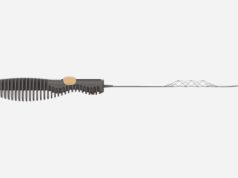 Rapid Medical has announced completion of the interim safety analysis from the multicentre, pivotal DISTALS study, reporting no safety concerns in medium vessel occlusions at the ongoing European Society of Minimally Invasive Neurological Therapy (ESMINT) congress (4–6 September, Marseille, France).
Rapid Medical has announced completion of the interim safety analysis from the multicentre, pivotal DISTALS study, reporting no safety concerns in medium vessel occlusions at the ongoing European Society of Minimally Invasive Neurological Therapy (ESMINT) congress (4–6 September, Marseille, France).
“We are pleased that the DSMB [data safety monitoring board] found that the safety profile of Tigertriever 13 allows us to continue randomisation,” said DISTALS study principal investigator David Fiorella (Stony Brook University Medical Center, Stony Brook, USA). “This reflects its unique design, which facilitates thrombectomy procedures in smaller vessels given its low profile and adjustability.”
Per protocol, all safety data—including the rate of symptomatic intracerebral haemorrhage (sICH)—were analysed for 82 patients by the DSMB, which includes Joshua Hirsch, Robert W Regenhardt (both Massachusetts General Hospital, Boston, USA), Thabele (Bay) Leslie-Mazwi (University of Washington, Seattle, USA), and Scott Hamilton (Stanford Medicine, Stanford, USA). The data were also adjudicated by the imaging core lab and the clinical event committee (CEC).
As stated in a Rapid press release, Tigertriever 13’s adjustability engages the clot and then relaxes to minimise vessel traction upon removal. Published data indicate distal stroke treatment performed with the device can lead to higher revascularisation success and post-treatment patient outcomes, with 78% recanalisation success compared to 42% with medical management.
“With safety at the core of the DISTALS study, the interim data are very reassuring,” said Walid Haddad, chief clinical officer at Rapid. “We are thrilled to partner with a rigorous team of physicians to expand thrombectomy to undertreated areas of the brain like medium vessel stroke.”









